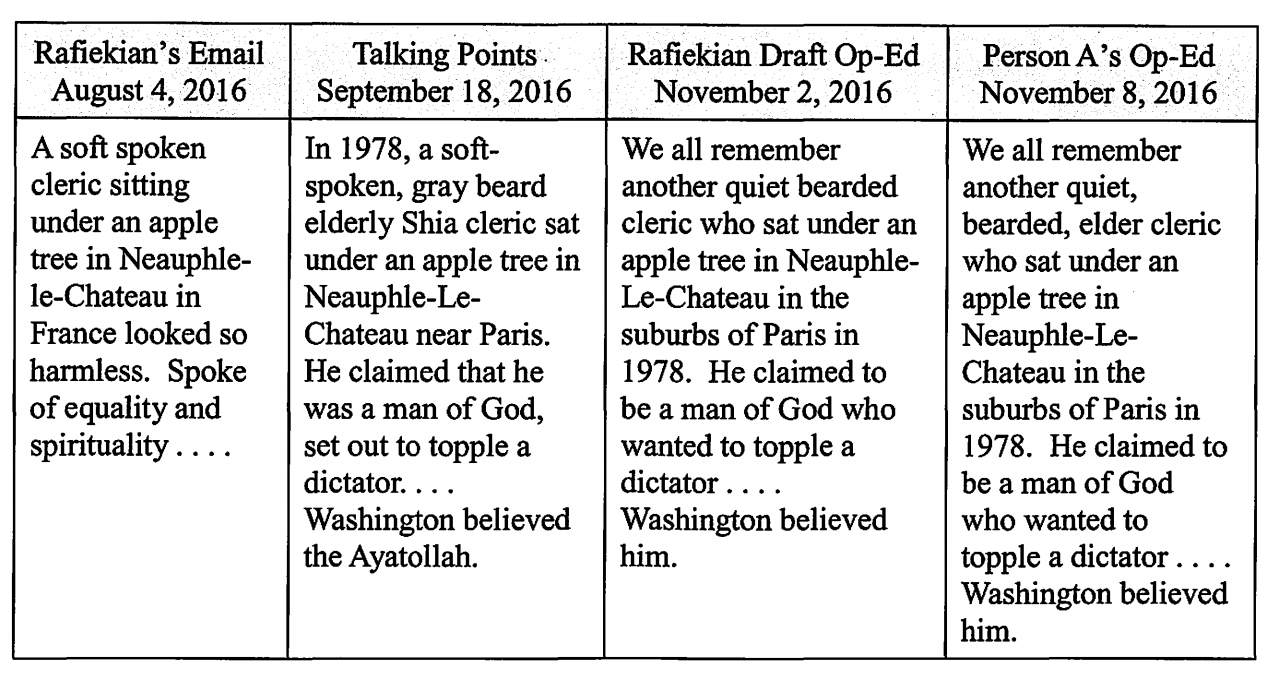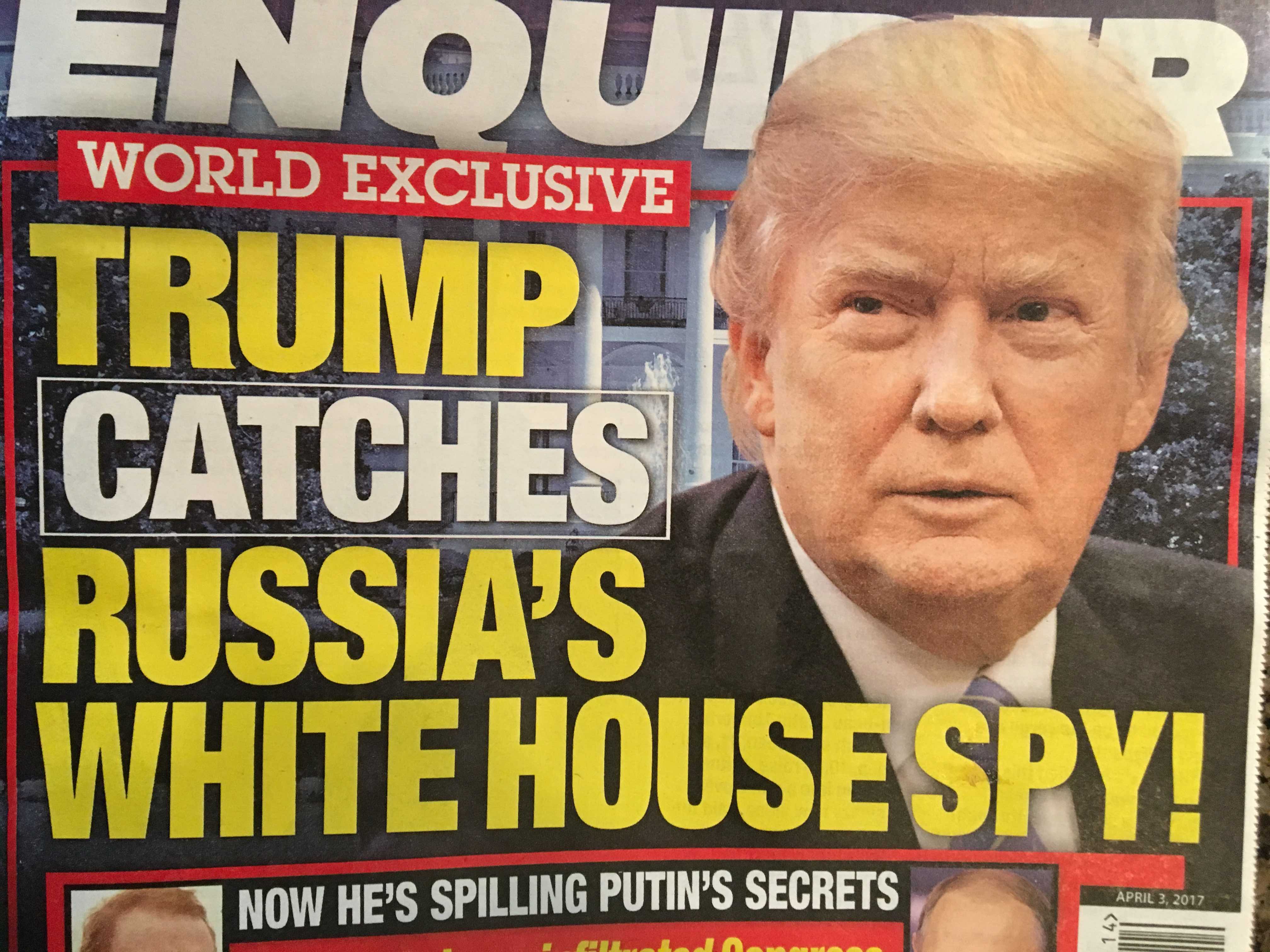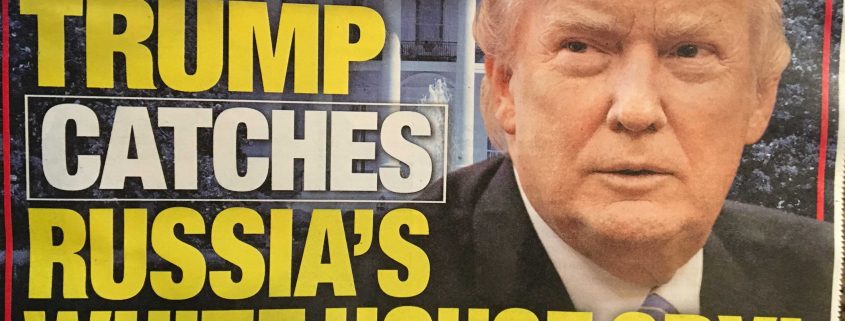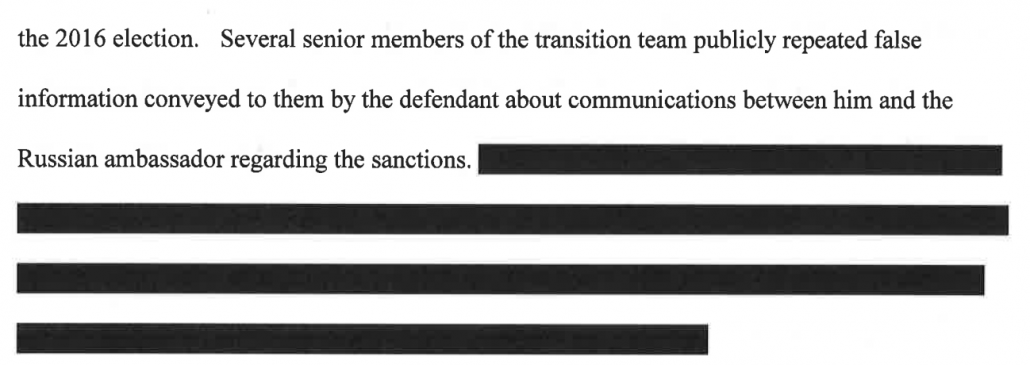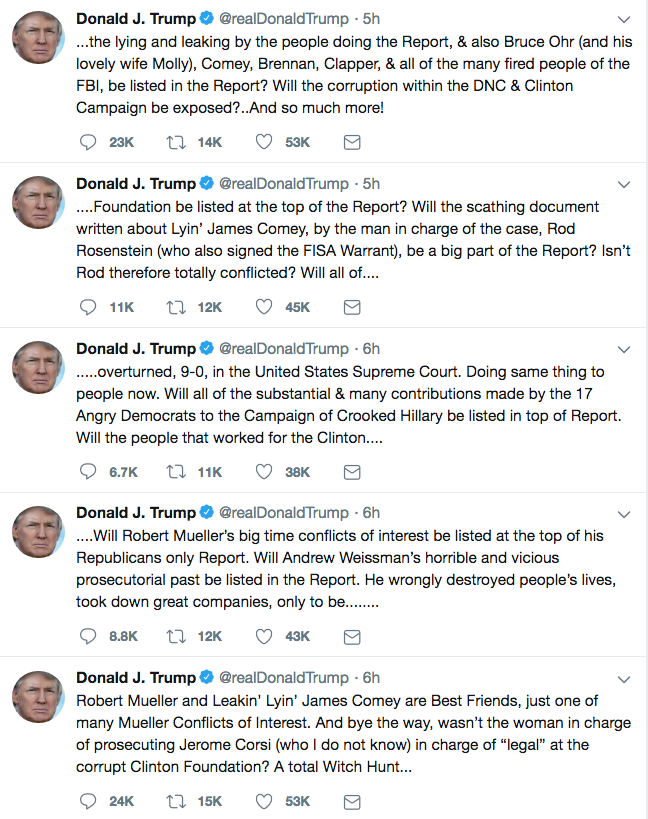Among the things I remain most amazed by, in the Russian investigation, is that even while Trump and the GOP are trying to discredit the Mueller investigation by claiming, without evidence, that the Deep State had a bunch of informants infiltrate Trump’s campaign, no one has ever alleged that Felix Sater had been sent by the Deep State, even though he had a known background of being an informant for the Deep State before this whole thing began. And while Trump has attacked Michael Cohen viciously since he discovered (after his personal lawyer got raided by the Feds), that Cohen had recordings that exposed Trump personally, it still seems that Cohen and Sater may be shading their coordinated testimony to protect Trump from the worst implications of the Trump Tower deal. I’ve even heard chatter that Cohen remained in touch with Trump as recently as September.
I argued back in August 2017 that Mueller had seemed to form a prosecutorial team with the lessons his FBI learned via Felix Sater. That was before BuzzFeed reported in March that Sater actually had ties to six of Mueller’s prosecutors, starting with Andrew Weissmann.
Today, as he is being questioned about Trump’s business deals and ties to Russia, he has built relationships with at least six members of special counsel Robert Mueller’s team, some going back more than 10 years.
[snip]
Signing Sater’s cooperation agreement for the Department of Justice was Andrew Weissmann, then an assistant US attorney and now a key member of the special counsel’s team. Mueller himself would be the FBI director for most of the time Sater served as a source.
Even given the extensive background Mueller’s team has with Sater, they seem to have delayed interviewing him until fairly late in the process: December 2017. And it looks like Sater was no more forthright when he first met with Congress (and therefore possibly even Mueller’s team) than Cohen was.
In anticipation of today’s sentencing filings, I’d like to track the evolving stories on the Trump Tower deal, because I’m genuinely curious whether Cohen has now been more forthcoming than Sater.
May 31, 2017: Cohen and his lawfirm subpoenaed by HPSCI. Facing the problems with the Trump Tower story would have come up within weeks of Jim Comey’s firing, when the House Intelligence Committee — which was still conducting a marginally credible investigation — first asked and then subpoenaed him for documents. Ironically, they were likely after documents pertaining to the Steele dossier allegations, which may have been why Devin Nunes so readily assented to a subpoena. Those allegations have amounted to nothing, thus far.
July 8, 2017: First report on June 9 meeting creates a rush for testimony on that topic.
July 19, 2017: SJC requests documents from Trump organization. The request was written targeted specifically to the influence campaign, not ties with Russia generally, though it should have at least obligated Trump Organization to preserve the company’s contacts with Russian government officials.
If this has not yet been done, we ask that you immediately take steps to preserve all relevant documents in the possession, custody, or control of the Trump Organization related to Russian interference in the 2016 election, including documents related to the Trump Organization’s or Trump campaign’s3 contacts with: Russian government officials, associates, or representatives; any individuals who purported to act or whom were believed to be acting on behalf of Russian government officials, associates, or representatives; anyone who might have been involved in or in receipt of information obtained as a result of Russia’s influence campaign
But Sater was not among those it included in the communication list.
all communications to, from, or copied to the Trump Organization relating to Rob Goldstone, Emin Agalarov, Aras Agalarov, Natalia Veselnitskaya, Rinat Akhmetshin, Anatoli Samochornov, Irakly (Ike) Kaveladze, Christopher Steele, Aleksej Gubarev, Webzilla B.V., XBT Holdings S.A., Alfa Group, Dmitry Peskov, Vladimir Putin, the Ritz Carlton Moscow Hotel, Paul Manafort, Carter Page, Igor Sechin, Sergei Ivanov, Igor Divyekin, Sergei Millian, Dmitry Medvedev, Michael Flynn, Jill Stein, Michael Cohen, Konstantin Kosachev, Viktor Yanukovych, Corey Lewandowski, Sergei Kislyak, Yuri Ushakov, Anton Vaino, Mikhail Kalugin, Andrei Bondarev, Mikhail Fridman, Petr Aven, German Khan, Oleg Govorun, Sergey Lavrov, Rosneft, Sergei Kiriyenko, Oleg Solodukhin. This shall include any documents referring to any of the aforementioned using alternate spellings, pseudonyms, nicknames, abbreviations, or codes;
The very same day SJC submitted a document request that would not cover Trump’s business ties to Russia, the NYT published the interview in which it obediently set a “red line” on Trump’s businesses that Mueller should not cross.
August 27-28, 2017: Probably because of the way the June 9 meeting was disclosed, Congress more aggressively pursued testimony on it than on other issues. As a result, Don Jr got a request — and an early hearing date — for testimony from the Senate Judiciary Committee. In the lead-up to that (and to his own SSCI interview), Michael Cohen conducted a preemptive limited hangout on the Trump Tower story. It started with a WaPo scoop that cited several people familiar with the proposal when telling Cohen’s partial version, one of whom must be Cohen.
Trump never went to Moscow as Sater proposed. And although investors and Trump’s company signed a letter of intent, they lacked the land and permits to proceed and the project was abandoned at the end of January 2016, just before the presidential primaries began, several people familiar with the proposal said.
The next day, the Trump Organization turned over [some, but obviously not all of the] emails on the deal to Congress, leading to more reporting on it. At the same time, Cohen turned over a statement on the projected project, the following parts of which got quoted in his statement of the offense.
The proposal was under consideration at the [Company] from September 2015 until the end of January 2016 . By the end of January 2016 , I determined that the proposal was not feasible for a variety of business reasons and should not be pursued further . Based on my business determinations, the [Company] abandoned the [Moscow Project] proposal . To the best of my knowledge , [Individual l] was never in contact with anyone about this proposal other than me on three occasions . I did not ask or brief [Individual l] , or any of his family , before I made the decision to terminate further work on the proposal.
I primarily communicated with the Moscow- based development company . through a U. S . citizen third- party intermediary , [Individual 2] . [ Individual 2] constantly asked me to travel to Moscow as part of his efforts to push forward the discussion of the proposal . I ultimately determined that the proposal was not feasible and never agreed to make a trip to Russia . Despite overtures by [Individual 2] , I never considered asking [Individual l] to travel to Russia in connection with this proposal .
In mid- January 2016 , [Individual 2] suggested that I send an email to [Russian Official l] , the Press Secretary for the President of Russia , since the proposal would require approvals within the Russian government that had not been issued . Those permissions were never provided . I decided to abandon the proposal less than two weeks later for business reasons and do not recall any response to my email , nor any other contacts by me with [Russian Official l] or other Russian government officials about the proposal
Also that day, WSJ reported another part of the cover story: that Cohen had talked to Trump about it, but just three times. Later that day, WSJ published an interview with Cohen who described, in helpful detail for anyone trying to coordinate stories, the three contacts with Trump about it he admitted to.
In 2015, Mr. Cohen said, he informed the then-candidate that he was working on a licensing deal for a Trump Tower in Moscow. He subsequently asked for and received Mr. Trump’s signature on a nonbinding letter of intent for the project in October 2015. And in January 2016, he said, he informed the then-candidate that he had killed the proposal. Mr. Cohen said each conversation was brief.
NYT, too, picked up the story, even republishing fragments of emails sent during 2015. It did repeat Felix Sater’s boast that by building a Trump Tower it could get Trump elected. However, it quotes Sater seemingly backing the shortened (September 2015 through January 2016) timeline of the deal.
“During the course of our communications over several months, I routinely expressed my enthusiasm regarding what a tremendous opportunity this was for the Trump Organization,” Mr. Sater said.
By August 28, all media outlets had focused on the January 2016 Cohen email to the general press line for Dmitri Peskov, which was attention getting (because it involved Putin’s close aide) but could also be pitched to show (because Cohen used the general press line rather than a more direct line to Peskov) how few contacts with Russia Cohen purportedly had. Trump Organization provided a statement that mirrored Cohen’s lie that the deal had died in January 2016. It is clear that Cohen and Trump Organization coordinated this roll-out. Yet Cohen has not yet publicly disclosed that coordination.
August 30, 2017: On August 30, Dmitri Peskov substantially backed Cohen’s story. Notably, he denied knowing either Cohen or Sater and said that Vladimir Putin had never known about the deal. It’s possible — likely, even — that Peskov was just taking cues from Cohen’s public leaks of his cover story, though it would awfully damning if this coordination went further.
August 31, 2017: Then, Cohen released the letter his attorney had sent — two weeks earlier — along with two earlier tranches of documents for Congress. Having done his limited hangout of the Moscow deal, releasing the letter that focused entirely on his denials with respect to the Steele dossier shifted the focus back on that.
September 7, 2017: SJC interviews Don Jr. While he didn’t tell huge lies, he nevertheless claimed to know “very little” about the 2015-2016 Trump Tower Moscow deal, being only “peripherally aware” of the negotiations. Perhaps his most specific lie was that he did not know of Trump lawyer Michael Cohen’s outreach to the Kremlin seeking President Vladimir Putin’s help on the deal until that news had been reported by the press just weeks earlier.
September 19, 2017: Cohen attempts to preempt an interview with SSCI by releasing a partial statement before testifying, only to have SSCI balk and reschedule the interview. The statement alluded to, but did not incorporate, the statement on the Trump Tower deal he had released on August 28, though even his allusion to it included lies.
I assume we will discuss the rejected proposal to build a Trump property in Moscow that was terminated in January of 2016; which occurred before the Iowa caucus and months before the very first primary. This was solely a real estate deal and nothing more. I was doing my job. I would ask that the two-page statement about the Moscow proposal that I sent to the Committee in August be incorporated into and attached to this transcript.
October 24, 2017: HPSCI interviews Cohen. The timing of the interviews of the three players in the Trump Tower deal is rather curious, especially given Richard Burr’s recent suggestions the committee is working closely with Mueller. SSCI got Cohen and Don Jr on the record during the same period HPSCI was getting all three on the record. But SSCI doesn’t yet get Sater on the record, and it’s not until that same time period (presumably after the HPSCI interview) until Mueller gets Sater, even with his long relationship with six of Mueller’s team members, on the record. As the HPSCI report makes clear, however, as late as December 14, Sater was still telling a story that conflicts with the story both he and Cohen are currently telling.
October 25, 2017: SSCI interviews Cohen.
December 6, 2017: HPSCI interviews Don Jr. Of the three men, Don Jr gets closest to the truth in his interview with HPSCI, but in ways that conflict with his September SJC testimony.
December 13, 2017: SSCI staff interviews Don Jr.
December 14, 2017: HPSCI interviews Felix Sater in his lawyers’ NYC office.
December 2017: Mueller interviews Sater.
March 5, 2018: Mueller adds questions about the Trump Tower deal to those he wants Trump to answer. Note, this comes in the wake of Rick Gates’ cooperation deal; we still do not know what senior campaign official knew of Cohen’s attempts to travel to Russia as part of the Trump Tower deal but it’s possible Gates was in the loop on it.
March 12, 2018: BuzzFeed’s first long piece relying on Felix Sater focuses (like his statement to HPSCI) on his time as an informant, not the Trump Tower deal. It does, however, provide an unsatisfying explanation for why he thought building a Trump Tower would help Trump get elected.
Did he think the Trump Moscow deal could get Trump elected?
Even Trump “is fucking surprised he became the president.”
Then why send that email?
“If a deal can get done and I could make money and he could look like a statesman, what the fuck is the downside, right?”
It also includes details on the Ukrainian deal, and ends with Sater’s insistence (among comments explaining why he won’t say mean things about Trump) that once Trump leaves office he intends to build Trump Tower.
“First thing I plan to do when Trump leaves office, whether it’s next week, in 2020 or four years later, is march right into his office and say, ‘Let’s build Trump Moscow.’
“I’m serious.”
It also shows that the statement Sater gave to HPSCI doesn’t address his involvement with Trump at all, but instead focuses on his service as an informant. Which may explain the gratuitous statement on those activities in HPSCI’s report.
March 15, 2018: NYT reports that Mueller has subpoenaed Trump Org for documents relating to Russia, which it uses to suggest Mueller is inching closer to the false red line the NYT so obediently set in August 2017. Keep in mind: by this point the known witnesses on Trump Tower had claimed there was no follow-up on the Peskov email, which suggests they had reason to believe the discovery shared with Congress (which is what Mueller got in the first round) did not tell the complete story. If Gates was in the loop on the Cohen negotiations, Mueller would have known by that point that Trump Organization had withheld responsive documents.
March 22, 2018: HPSCI releases Russia Report. It shows that both Sater and Cohen were telling the same cover story when they met with the committee in October and December 2017, respectively, Don Jr’s December testimony was closer to the truth (and as such probably in conflict with his September testimony to SJC). But as the bolded passages make clear, HPSCI had a pretty good idea they were being lied to.
In approximately September 2015, he received a separate proposal for Trump Tower Moscow from a businessman named [Sater] According to Cohen, the concept of the project was that “[t]he Trump Organization would lend its name and management skills, but It was not going to borrow any money and it would not have any resulting debt for the purchase of the land and the building of the facility.”;~ Cohen worked on this idea with [Sater] and his company, the Bayrock Group, a real estate consultancy that had previously worked with the Trump Organization.
[gratuitous paragraph on what a colorful fellow Sater is — see note on statement, above]
(U) After signing a letter of intent with a local developer in October 2015,36 Cohen and [Sater] exchanged a number of emails and text messages in late 2015 detailing their attempts to move the project forward. For instance, in December 2015, [Sater] tried to get Cohen and candidate Trump to travel to Russia to work on the project.
(U) Several of [Sater’s] communications with Cohen involved an attempt to broker a meeting or other ties between candidate Trump and President Putin, and purported to convey Russian government interest in the project. Perhaps most notably, [Sater] told Cohen in a November 3, 2015, email, “[b]uddy our boy can become President of the USA and we can engineer it.” 39 [Sater] continued that if “Putin gets on stage with Donald for a ribbon cutting for Trump Moscow, . .. Donald owns the republican nomination.” 10 This assertion apparently arose from [Sater’s] rather grandiose theory that cementing a deal with a hostile U.S. adversary would increase candidate Trump’s foreign policy bona fides.41
(U) Sater testified that his communications with Cohen regarding President Putin were ”mere puffery,” designed to elicit a response from the · Trump Organization to move the project along.42 [Sater] explained that “[u]ntil the bank writes the check, it’s all salesmanship and promotion to try to get many, many, many parties towards the center to try to get the deal done.” 43 Cohen similarly characterized [Sater] as “a salesman” who “uses very colorful language.”44
(U) When the project started proceeding too slowly for the Trump Organization,45 Cohen and [Sater] began to exchange acrimonious text messages. 46 As part of those text messages [Sater] told Cohen that President Putin’s people were backing the deal, including “this is thru Putins [sic] administration, and nothing gets done there without approval from the top,” as well as meetings in Russia with “Ministers” and “Putins [sic] top administration people.”] [Sater] also mentioned Dmitry Peskov (President Putin’s spokesman) would “most likely” be included. 48
(U) Cohen thus attempted to reach out to members of the Russian government in an attempt to make the project proceed, but apparently did not have any direct points of contact. for example, Cohen sent an email to a general press mailbox at the Kremlin in an effort to reach Peskov.49 Cohen’s message notes that he has been working with a local partner to build a Trump Tower in Moscow and that communications have stalled with the local partner.50 The email further seeks contact with Peskov so they may ” discuss the specifics as well as arrang[e] meetings with the appropriate individuals.”51 Based on the documents produced to the Committee, it does not appear Cohen ever received a response from anyone affiliated with the Russian government.
(U) [Sater’s] testimony likewise made clear that neither President Putin nor any element of the Russian government was actually directly involved in the project. For instance, in one exchange, [Sater] testified he was offering the Trump Organization access to one of his acquaintances. This acquaintance was an acquaintance of someone else who is “partners on a real estate development with a friend of Putin’s.” 52
[Sater] testified that he was unaware of “any direct meetings with any [Russian] government officials” in connection with the Trump Tower Moscow project.53 In addition, neither candidate Trump nor Cohen traveled to Russia in support of the deal.54
[U] It appears the Trump Tower Moscow project failed in January 2016.57 Trump Jr. testified that, as of early June 2016, he believed the Trump Tower Moscow project was dormant.53 The project failed because “[t]he due diligence did not come through” and the Trump Organization’s representative “lost confidence in the licensee, and [he] abandoned the project.”59 In fact, the Trump Organization did not have a confirmed site, so the deal never reached the point where the company was discussing financing arrangements for the project.60 The Committee determined that the Trump Tower Moscow project did not progress beyond an early developmental phase, and that this potential licensing deal was not related to the Trump campaign.61
So by March 22, at least some of the people with influence over the HPSCI report (it’s unclear whether Democrats had any influence on the final product at this point at all) had doubts about whether Cohen got a response from the Kremlin, used hedged language about whether either candidate Trump or Cohen planned on traveling to Russia (a particularly important hedge, as Cohen appears to have made plans to do so specifically in response to the June 9 meeting), and didn’t entirely believe the deal failed in January. Indeed, Don Jr’s language suggested it continued afterwards.
April 4, 2018: SSCI interviews Felix Sater. Given that Sater almost certainly lied in his Mueller interview — given its proximity to the interview with HPSCI where he told the cover story — this may have been an attempt to see what the interim story would be. Note that it immediately precedes the Cohen raid. The BuzzFeed story published the following month, which noted discrepancies between Sater’s then currently operative story and Cohen’s, suggests that Sater did provide more of the truth to SSCI, noting, for example, that Trump got regular updates.
Last month, Senate Intelligence Committee staffers peppered Sater for hours with questions about the Trump Moscow project. Sater testified that Cohen acted as the “intermediary” for Trump Moscow and was eager to see the deal through because he wanted to “score points with Trump.”
Sater also testified that Trump would regularly receive “short updates about the process of the deal.”
And it revealed the plans went on into “at least” June.
[N]ew records show he was still working on it with Sater at least into June. In May, six weeks before the Republican National Convention in Cleveland, Sater asked Cohen when he and Trump would go to Moscow. In a text message, Cohen replied: “MY trip before Cleveland. Trump once he becomes the nominee after the convention.”
April 9, 2018: Cohen raided by SDNY, based on a subpoena that names “many” people. In litigation that follows, SDNY made several claims about Cohen’s cooperation to this point, including fact-checking whether or not he has been fully cooperative with Mueller’s inquiry. Key to that was Cohen’s efforts to limit what Trump Organization turned over.
Cohen also states that the SCO “had requested that the Trump Organization produce all of Mr. Cohen’s communications that were within the Trump Organization’s custody, possession, or control,” and that Cohen objected “on the grounds that [the request] called for production of privileged communications, among other things.” (Br. 8-9). Although in the ordinary course, the USAO-SDNY would not comment on investigative requests or demands made to third parties, particularly those from a separate office undertaking its own, independent investigation, in light of the representations made by Cohen’s counsel, USAO-SDNY contacted the SCO about these representations and understands they are not accurate. In particular, the SCO did not request that the Trump Organization produce “all communications” by Cohen in the Trump Organization’s possession or control irrespective of subject matter or privilege. Indeed, the request made by the SCO was considerably narrower, and specifically omitted, among other things, any documents that were protected by privilege or of a purely personal nature. Cohen nonetheless objected to that request for documents and, after discussions between Cohen’s counsel and the SCO, the SCO decided not to seek production at that time. That Cohen sought to preclude the Trump Organization from producing these third party communications belies both (i) his general assertion of cooperation, and (ii) his stated principal interest in protecting attorney-client communications. Indeed, a careful review of Cohen’s motion papers reveals that he does not purport to have personally produced any documents to the SCO.
The SDNY statement also included a redacted passage suggesting that Cohen (or perhaps Trump Organization?) may have already destroyed evidence.
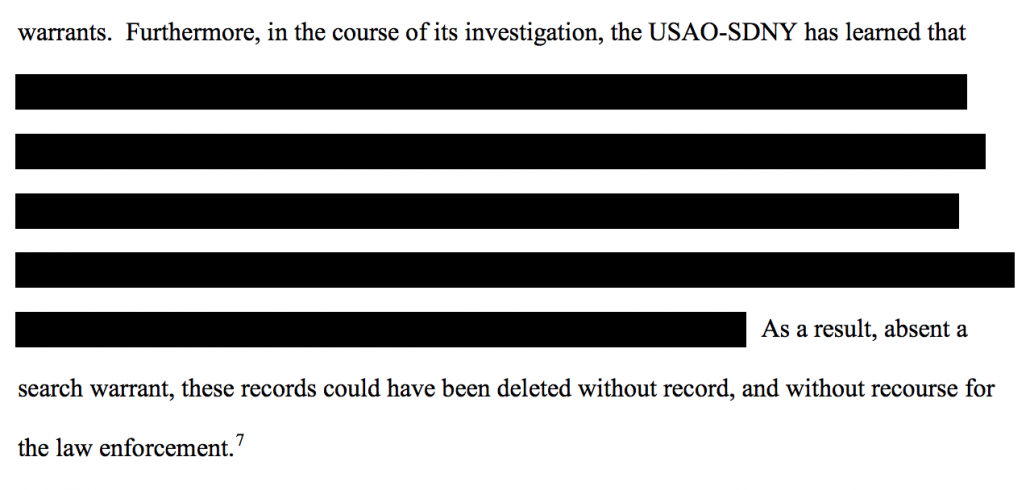
Elsewhere, the filing notes that “USAO-SDNY has already obtained search warrants – covert until this point – on multiple different email accounts maintained by Cohen,” which may by why they knew he might delete things.
For its part, Trump Organization tried to demand every single thing written between Cohen and the Trump Organization to be treated as privileged.
We consider each and every communication by, between or amongst Mr. Cohen and the Trump Organization and each of its officers, directors and employees, to be subject to and protected by the attorney- client privilege and/or the work-product privilege.
May 17, 2018: BuzzFeed presents what it calls the definitive story on Trump Tower deal, relying on “emails, text messages, congressional testimony, architectural renderings, and other documents.” As noted above, in the guise of telling BuzzFeed what his April testimony had been to SSCI, Sater admitted that Trump had gotten regular updates and that the deal went on into at least June.
But there were details that, the story made clear, Sater was still hiding. That includes the name of someone Sater and the developer, Andrey Rozov, met in early November 2015, in the Bahamas.
About a week after Trump signed the document, Sater and Rozov, the developer, went on vacation to the Bahamas. Rozov rented Little Whale Cay, a private island, for $175,000, and the two men went diving and spearfishing. In an email, Sater told Cohen that another, unidentified friend was flying in to join them. This mystery individual, who is not named in the documents and whom Sater would not identify, knew two of the richest and most powerful men in Russia, the Rotenberg brothers.
And there are differences between what Sater said publicly and what Cohen said. Sater focuses on this follow-up in the wake of Cohen’s attempt to reach Peksov.
Four days later, Cohen received a letter from Andrey Ryabinskiy, a Russian mortgage tycoon and boxing promoter. “In furtherance of our previous conversations regarding the development of the Trump Tower Moscow project,” Ryabinskiy wrote, “we would like to respectfully invite you to Moscow for a working visit.” The meeting would be to tour plots of land for the potential tower, to have “round table discussions,” and to coordinate a follow-up visit by Trump himself. Ryabinskiy did not return a message left with his attorney.
It is not clear how Cohen responded, but Sater asked Cohen for travel dates for both Cohen and Trump the same afternoon Ryabinskiy sent the letter. “Will do,” Cohen wrote.
Sater’s story doesn’t reflect the discussion with Peskov’s assistant that Cohen’s current story does.
Perhaps most remarkably, Sater seems to telegraph to Cohen a story about messages from between January and May being lost.
Sater has told investigators that during the first months of 2016, he and Cohen were using Dust, at Cohen’s suggestion, to communicate secretly about the Moscow project. Those messages, which were encrypted and are deleted automatically, have disappeared forever, Sater told BuzzFeed News. But on May 3, the day Trump won the Indiana primary and his top opponent Ted Cruz suspended his campaign, Sater sent Cohen an ordinary text message: “Should I dial you now?”
The claim that Sater and Cohen shifted to Dust and then shifted back to iMessage to plan travel in May doesn’t make any sense, and suggests something else is going on.
Finally, Sater’s story makes no mention of what Sater was doing in Trump Tower on July 21, ending instead with a dubious story about seeing a July 26 Trump tweet denying any business deals in Russia and realizing the deal was over. Anyone who knows Trump as well as Sater must, has to know that a public statement from Trump as often as not means the opposite of what he says. As I’ve suggested, it seems that the deal didn’t die, it just moved under a Sergei Millian and George Papadopoulos carried rock.
June 20, 2018: Cohen steps down from RNC position.
July 27, 2018: Sources claim Cohen is willing to testify he was present, with others, when Trump approved of the June 9 meeting with the Russians.
August 7, 2018: First Cohen proffer to Mueller.
August 21, 2018: Cohen pleads guilty to SDNY charges. Warner and Burr publicly note that Cohen’s claim to know about the June 9 meeting ahead of time conflicts with his testimony to the committee.
September 12, 2018: Second proffer.
September 18, 2018: Third proffer.
October 8, 2018: Fourth proffer.
October 17, 2018: Fifth proffer.
November 12, 2018: Sixth proffer.
November 20, 2018: Seventh proffer.
November 29, 2018: Cohen pleads guilty to false statements charge. In his statement to the court, he does not say that Trump (or anyone else at Trump Organization) ordered him to lie. Rather, he said that he did so to be consistent with Trump’s messaging.
I made these statements to be consistent with Individual-1’s political messaging and out of loyalty to Individual-1,
In his official statement, Rudy claims that Trump Organization turned over the documents underlying Cohen’s plea, which is almost certainly a lie.
It is important to understand that documents that the Special Counsel’s Office is using to show that Cohen lied to Congress were voluntarily disclosed by the Trump Organization because there was nothing to hide.
After the plea, Rudy gives an unbelievably hedged statement about whether the Trump Tower deal ever really died.
“The president, as far as he knows, he remembers there was such a proposal for a hotel,” Giuliani said. “He talked it over with Cohen as Cohen said. There was a nonbinding letter of intent that was sent. As far as he knows it never came to fruition. That was kind of the end of it.”
The day of Cohen’s plea, Sater provided BuzzFeed with materials and describes that he suggested giving Vladimir Putin a penthouse to make Trump Tower more lucrative. But he describes that as a marketing gimmick, not a FCPA-prohibited bribe that would further compromise Trump in his relationship with Putin.
Sater told BuzzFeed News today that he and Cohen thought giving the Trump Tower’s most luxurious apartment, a $50 million penthouse, to Putin would entice other wealthy buyers to purchase their own. “In Russia, the oligarchs would bend over backwards to live in the same building as Vladimir Putin,” Sater told BuzzFeed News. “My idea was to give a $50 million penthouse to Putin and charge $250 million more for the rest of the units. All the oligarchs would line up to live in the same building as Putin.” A second source confirmed the plan.
Given that BuzzFeed says this involved a Peskov representative, Sater may have been trying to hide this detail when he provided a different emphasis on the negotiations in the interviews leading up to the May story than Cohen did in his false statements admission (that is, Sater may have responded to seeing Cohen admit that detail by calling up BuzzFeed to provide a new limited hangout).
December 5, 2018: In his sentencing memorandum, Cohen repeats his line, from the oral statement he gave during his guilty plea, that he lied of his own accord.
Michael’s false statements to Congress likewise sprung regrettably from Michael’s effort, as a loyal ally and then-champion of Client-1, to support and advance Client-1’s political messaging. At the time that he was requested to appear before the Senate Select Committee on Intelligence and House Permanent Select Committee on Intelligence, Michael was serving as personal attorney to the President, and followed daily the political messages that both Client-1 and his staff and supporters repeatedly and forcefully broadcast. Furthermore, in the weeks during which his then counsel prepared his written response to the Congressional Committees, Michael remained in close and regular contact with White House-based staff and legal counsel to Client-1.
As such, he was (a) fully aware of Client-1’s repeated disavowals of commercial and political ties between himself and Russia, as well as the strongly voiced mantra of Client-1 that investigations of such ties were politically motivated and without evidentiary support, and (b) specifically knew, consistent with Client-1’s aim to dismiss and minimize the merit of the SCO investigation, that Client-1 and his public spokespersons were seeking to portray contact with Russian representatives in any form by Client-1, the Campaign or the Trump Organization as having effectively terminated before the Iowa caucuses of February 1, 2016.
Seeking to stay in line with this message, Michael told Congress that his communications and efforts to finalize a building project in Moscow on behalf of the Trump Organization, which he began pursuing in 2015, had come to an end in January 2016, when a general inquiry he made to the Kremlin went unanswered. He also stated that his communications with Client-1 and others in the Trump Organization regarding the project were minimal and ceased at or about the same time. In fact, Michael had a lengthy substantive conversation with the personal assistant to a Kremlin official following his outreach in January 2016, engaged in additional communications concerning the project as late as June 2016, and kept Client-1 apprised of these communications. He and Client-1 also discussed possible travel to Russia in the summer of 2016, and Michael took steps to clear dates for such travel.
In the heated political environment of the moment and understanding the public message that Client-1 wished to propagate, Michael, in his written statement to Congress, foreshortened the chronology of events and his communications with Client-1 to characterize both as having terminated before the Iowa caucuses. At the time, Michael justified his false summary of the matter on the ground that the Moscow project ultimately did not go forward. He recognizes that his judgment was fundamentally wrong, and wishes both to apologize and set the record straight.
Of course, this statement depends on the truth of the claim that the deal did not go forward — something about which Trump’s lawyer seems unconvinced and about which there is some evidence to the contrary. That is, this seems to be an effort to shift the date of the agreement to June or maybe July, when the deal was still active in January 2017 when Papadopoulos lied to try to keep his hand in that deal or even still active (as Sater said for the May story) for when Trump leaves office.
But the other problem with it is that Cohen’s explanation that he made up this cover story on his own, as a kind of mirror of Trump’s concerns rather than specifically conspiring to do so, only makes sense if he was the only person to tell this lie. But, at a minimum, Sater did, and Don Jr appears to have told a version of it. Now, it’s certainly possible that Cohen and Sater coordinated their story by leaking to the press; that’s the purpose the BuzzFeed stories seem to serve.
But if, as seems virtually certain, Trump Organization didn’t turn over any communications that would conflict with that cover story, then Cohen must have coordinated with Trump Organization, at a minimum. And given how Cohen stops short of attributing this move to Trump’s orders, whereas on the Stormy payoff he does attribute it to Trump, it seems to shy away from implicating Trump as much as must have happened.
Far more importantly, Russia seemed to know the outlines of the cover story, with Peskov matching what Cohen was saying (and Peskov has now matched Cohen’s currently operative story).
Given their past clear efforts to craft a joint limited hangout, and given a lot of other details about this story that don’t make sense, it seems that Cohen and Sater may still be working Mueller’s prosecutors (whom Sater knows as well as anyone).
That’s one thing we may get a sense of from the sentencing memo due by 5PM today. In any case, Cohen won’t get a 5K letter like Mike Flynn did. He still has some cooperating to do before Mueller will give him that. So if I’m right, he may still be caught in a dangerous game.
As I disclosed in July, I provided information to the FBI on issues related to the Mueller investigation, so I’m going to include disclosure statements on Mueller investigation posts from here on out. I will include the disclosure whether or not the stuff I shared with the FBI pertains to the subject of the post.








